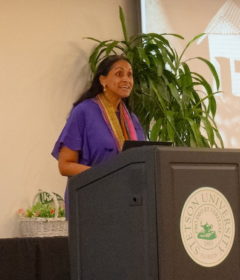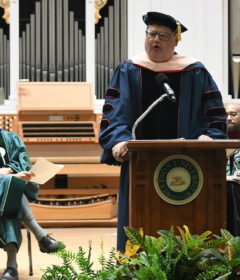DOJ Grant Expands Stetson’s Reach To Promote Student Safety
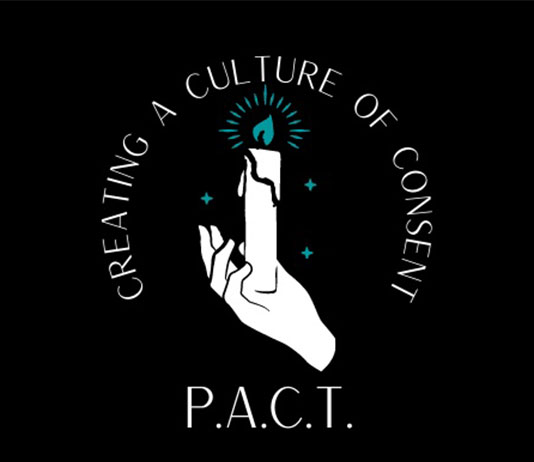
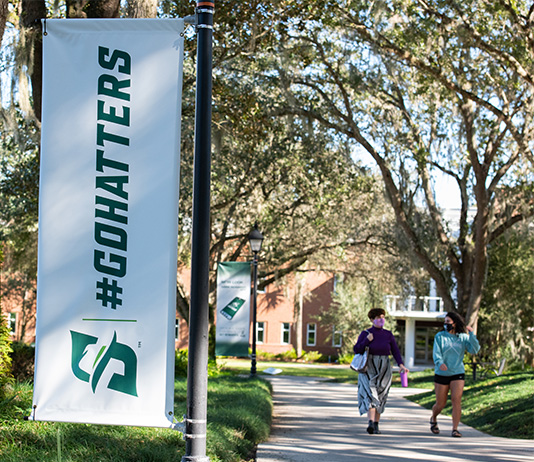
Stetson expands efforts to ensure the safety of their students when it comes to Domestic/ Dating Violence, Sexual Assault and Stalking (DVSAS) Prevention from a nearly $300,000 grant from the Department of Justice.
Transformational work has been happening on the student, faculty and staff levels led by Sara Smith-Paez director of Domestic Violence, Sexual Assault and Stalking Prevention.

In October 2020, Stetson was awarded a $296,000 grant to reduce Domestic/Dating Violence, Sexual Assault and Stalking on College Campus from the Department of Justice (DOJ)Office on Violence Against Women.
A cornerstone of this 3-year grant from the DOJ is establishing and maintaining a university-wide Collaborative Community Response Team (CCRT) that meets monthly to plan how to advance the goals of the grant and create a culture of consent on campus where the values of safety, respect, gender equity, bystander intervention and wellness are upheld.
CCRT members are trained in stalking prevention, engaging men in DVSAS prevention work and the mental health stigma as related to DVSAS.
The transformative work is extended to the campus community and included revisions to the retaliation section of the gender-based misconduct policy guide, which provides a clearer definition of retaliation as well as empower students to hold each other and the institution accountable.
The CCRT discussed risk assessments and trespassing procedures, in response to an intimate partner violence homicide at a university in Pennsylvania and the subsequent court hearings discussing a campus’s responsibility to protect students from nonstudents.
This led to an intimate partner violence risk assessment being added to the on-call training manual used by Stetson’s crisis response team.
This grant has also allowed Stetson to expand its collaborations with off campus partners including the Volusia Rape Crisis Center and the Beacon Center.
“The DOJ grant helps deepen our relationships in the greater DeLand and Volusia County communities, especially with the Volusia Rape Crisis Center and the Beacon Center,” said Lyda Kiser, director of Title IX. “These agencies are important for providing options to Stetson students, faculty and staff- we really need their partnership.”
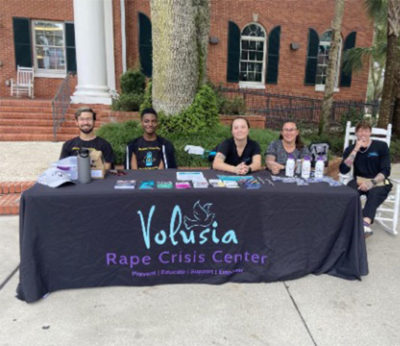
The Director of Volusia Rape Crisis Center serves on Stetson’s CCRT and helps facilitate victim advocates on campus. Smith-Paez takes a student-centered and student- lead approach to prevention education on the importance of students being heard as well as their understanding of what services are available to them.
Another foundational goal of the grant is to support how Stetson’s Public Safety officers handle dynamic situations and respond to student needs. Because of the grant, Public Safety has added three trainings to their required onboarding training for officers: Trauma Informed Response to DVSAS Disclosure, Self-Care in a Traumatic Field and A Guide to Gender-Based Misconduct Response at Stetson.
“Public Safety is especially grateful for the wonderful training we have received on responding to DVSAS disclosures and self-care in a traumatic field. We look forward to receiving more training provided by the DOJ grant,” said Dee Carpenter, captain of Public Safety.
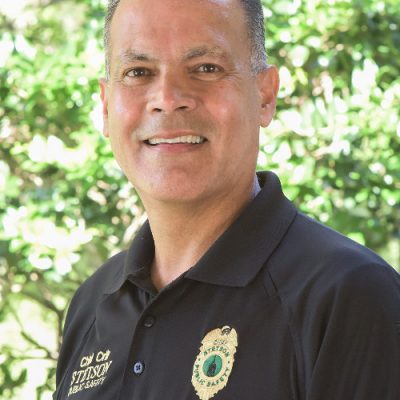
Smith-Paez in collaboration with Chief of Public Safety Francisco Ortiz and Student Counseling Services host intentional conversations and training on de-escalation and navigating conflict.
The Beacon Center has also collaborated with Stetson to develop a weekly support group for survivors of dating or domestic violence and provide free transportation to the meetings.
Since Stetson received the DOJ grant, the Peer Advisory Council for Title IX (PACT) was founded in collaboration with the Title IX Department, Wellness and Recreation and student leaders.
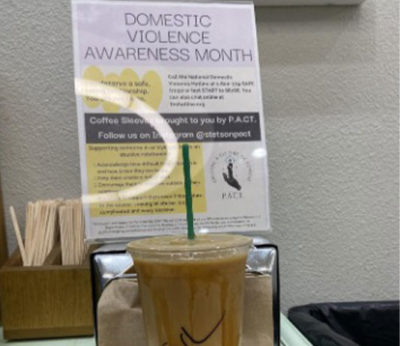
“PACT is such an important resource for the Stetson community and this grant has allowed PACT to reach out and educate with resources that are from a student perspective,” said Kiser.
PACT Program Leads go through rigorous and continuous training to equip them to talk to their peers about DVSAS.
“My experience with PACT has significantly changed my life,” said Victoria Ramon, PACT program lead. “I’ve learned so much about advocating for student needs and how to talk to students about such a difficult topic. Working under Sara has been amazing because she helps students cultivate their leadership skills and ensures that we have skills that translate to whatever career we end up in. This experience has let me learn about different parts of campus that I would not have really interacted with otherwise. Working on the ‘Masculinity is What You Make It’ campaign has allowed me to talk to people in greek life and athletics about topics that they might not talk about on their own, that alone has empowered me to talk to people about issues that they may not acknowledge or realize impact them.”
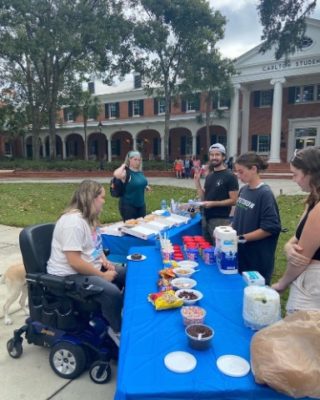
PACT’s educational programming reached approximately 23% of Stetson’s student body in spring 2022. This fall, PACT has reached 27% of the undergraduate student population.
Sorority Presidents, Vice Presidents and New Member Recruitment leaders have been required to attend a workshop on “Leading for a Culture of Consent,” once a year.
“Fraternity & Sorority Involvement is grateful for such an amazing partnership created because of the DOJ grant. Since the DOJ grant, we have seen increased collaboration and educational programming with higher student input,” said Renee DuBois, associate director of Fraternity & Sorority Involvement and Student Organizations, Student Development & Campus Vibrancy.
Outreach to Fraternities and Sororities is essential in achieving the goals set out by the grant. Greek Life involvement in DVSAS prevention has increased since spring 2021.
PACT tabled in front of the CUB, once a week for the first six weeks of the fall 2022 semester focusing on a new weekly educational activity. Since September, PACT has already reached around 6.5% of the student population.
Prior to the end of the fall semester, a survey will be conducted to examine attitudes toward DVSAS at Stetson. Surveys and discussions are being hosted with all the departments in Campus Life and Student Success, to assess the training needs of faculty and staff regarding DVSAS. The data will determine the accomplishments of the grant as well as highlight the opportunities for improvement.

Smith-Paez has high hopes and deep belief in what this work can accomplish.
“This work is hard, but I’ve seen the subtle signs of culture change throughout student attitudes and staff willingness to address these issues,” said Smith-Paez. “That makes it all worth it. And I believe the change is just beginning. The place we will arrive at, through some missteps and storms (literal and metaphorical), will set Stetson apart as an example of what a university can be if it dedicates itself to supporting survivors, empowering students and creating a culture of consent.”

